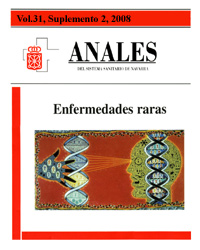Rare diseases: medicine’s challenge in the XXI Century
Keywords:
Enfermedades raras, Medicamnetos huérfanos, EpidemologíaAbstract
Rare diseases (RD) are receiving increasing attention within both the scientific community and society in general. Many RDs are diagnosed during paediatric age and affect the patient throughout his life, but they can also be diagnosed during adult age. Advances in the biochemical, molecular and genetic diagnosis of these diseases are proving essential in improving clinical understanding and therapeutic possibilities. However, their low prevalence makes it difficult to develop suitable medicines for treatment and it is necessary to implement specific social and health protection programs for these medicines, which are called orphan medicines (OM). In general these serious, chronic diseases involving a high degree of disability are difficult to diagnose. For better diagnosis and monitoring it is necessary to develop reference units at the state level that will improve our knowledge of these pathologies. RDs have a direct repercussion on both the family, which in many cases becomes the carer, and on society, which must develop specific social, health and educational programs to support these patients. In short, RDs form a significant challenge of coordination for the scientific community and for society given their significant specific weight in the development of health care in our setting.Downloads
Downloads
Published
How to Cite
Issue
Section
License
La revista Anales del Sistema Sanitario de Navarra es publicada por el Departamento de Salud del Gobierno de Navarra (España), quien conserva los derechos patrimoniales (copyright ) sobre el artículo publicado y favorece y permite la difusión del mismo bajo licencia Creative Commons Reconocimiento-CompartirIgual 4.0 Internacional (CC BY-SA 4.0). Esta licencia permite copiar, usar, difundir, transmitir y exponer públicamente el artículo, siempre que siempre que se cite la autoría y la publicación inicial en Anales del Sistema Sanitario de Navarra, y se distinga la existencia de esta licencia de uso.








